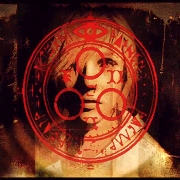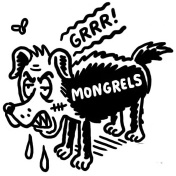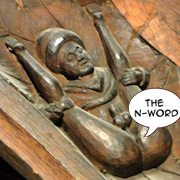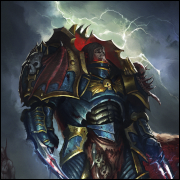|
Man that reminds me how horrifying I found the denazification chapters of Postwar by Tony Judt (Great read by the way, I recommend it), cuz yeah, that narrative was pushed into all generations afterwards everywhere but then you're faced with the reality of how shallow and weak denazification really was that nobody taught you in school and you're like jesus. so many high society/professionals who were collaborators or straight up card carrying enthusiastic nazis got to stay and guide the postwar futures of their countries. I guess nazi doctors are better than a scarcity of doctors though? but then you get to the eastern bloc and Greece it's even worse cuz they're unswervingly brutal and use denazification trials to just get whatever motherfuckers executed that they don't happen to like, former nazi or not.
|
|
|
|

|
| # ? May 13, 2024 21:47 |
|
TheFallenEvincar posted:Man that reminds me how horrifying I found the denazification chapters of Postwar by Tony Judt (Great read by the way, I recommend it), cuz yeah, that narrative was pushed into all generations afterwards everywhere but then you're faced with the reality of how shallow and weak denazification really was that nobody taught you in school and you're like jesus. so many high society/professionals who were collaborators or straight up card carrying enthusiastic nazis got to stay and guide the postwar futures of their countries. I guess nazi doctors are better than a scarcity of doctors though? Don't worry, the east hosed it up too. The idea that they were super-good at denazification due to their firmer ideological objections is one of those things that became current when people in the late 60s and early 70s were looking around in W. Germany and realizing how many of the fuckers were still around, and then taking the E. German official line too much at face value. It was a useful tool when protesting about how people who had ordered the execution of deserting kids in April '45 were still on the bench, but it's increasingly apparent that it wasn't as cut and dry as that. There is a lot of scholarship now that shows that while the top-level stuff (judiciary and academia especially) was more thorough than in the west the status of mid-level professionals like doctors and teachers was more or less the same. From Nazisim to Communism: German schoolteachers under two dictatorships by Lansing is a good example of this. He does a really good job of showing just how much continuity there was between teachers in Brandenburg between the Nazi and early Communist eras. What happened was that a lot of people got kicked out in the first, blanket wave of firings but then got re-hired as they were certified to not be nazis. That certification was a pretty rubber-stamp affair since they had a dire teacher shortage, so only the people who were the most implicated didn't get their jobs back. You could be a no bullshit member of the Nazi party and be back in a classroom by 1952, whether you're talking about West or East Germany. To give you an idea, one of the guys I ran across in my own research was fired during the initial de-nazification sweep, rehired a few years later, then fired again when his conduct during the early Nazi era came to light. His problem? He published a ton of really bad poetry celebrating Adolph Hitler as the best thing to ever happen to Germany. Even then he only got that additional scrutiny because he had moved up to the administrative ranks. If he had stayed a classroom teacher no one really would have given a poo poo as long as he didn't start spouting Nazi bullshit in the classroom. One of the things you have to understand about governments dominated by a single political party (other easy examples are most communist governments, the Ba'athists in Iraq, etc) is that some level of interaction and participation with the party quickly becomes a sine qua non for any kind of professional activity and career advancement. In the case of the NSDAP they made party-affiliated professional organizations a flat out requirement. No one who taught in German schools in the early 40s got away without being a member of the state teacher's organization, the NSLB. poo poo like that is why the denazification paperwork had to include an entire category for people who were only incidental participants in the Nazi project. On the upside this gave them a way to actually have something resembling a civil society in Germany after the war, because the alternative was to not let anyone born between 1880 and 1930 do anything at all. The downside was that along with all the people who were no more guilty or innocent than the population as a whole you had a bunch of real assholes who managed to get a clean certification and go on to have successful post-war careers. That said, there are layers where it was scandalous. The people protesting in '68 and mad about the guys in the judiciary had a point, after all.
|
|
|
|
Cyrano4747 posted:Don't worry, the east hosed it up too. The idea that they were super-good at denazification due to their firmer ideological objections is one of those things that became current when people in the late 60s and early 70s were looking around in W. Germany and realizing how many of the fuckers were still around, and then taking the E. German official line too much at face value. This is similar to what I've read about the decolonization process taking place in Korea in the late 40s. While many blame the American military occupation for propping up Koreans who had collaborated with the Japanese, there were plenty of those types in the North Korean sphere as well (especially, as you pointed out, in the middling to lower ranks of civil society). There was also the issue of defining who exactly was a collaborator: was it every businessman who worked with the Japanese? Every cop? Every bureaucrat? It was tricky to define and, in the end, US authorities often didn't bother to sort it out. This had disastrous consequences when revolts broke out. When mutinying soldiers and communist revolutionaries seized the town of Yosu in 1948, they started off executing people who had openly collaborated with the Japanese or Americans (rich landowners, the local police), but then ran out of collaborators and started killing people for crimes like dressing too well after a quick sentencing from a kangaroo court that they called the "People's Death Courts." It's really interesting how these tensions ended up shaping so much of the post-WWII world order and domestic politics in so many countries.
|
|
|
|
And it's extra thorny because it's totally understandable why they did it. Somebody has to administrate the place and you don't necessarily have a lot of options. In Iraq the De-Baathification process went to the extreme that it didn't in Germany/Japan and is a big reason why ISIS exists now.
|
|
|
|
Grand Fromage posted:Thanks for the computer suggestions, I'm checking a few out now. I was also reading a random Wikipedia article and therefore want to read something about the Victorian era Royal Navy. Preferably about Asian stations but I'm okay with anything good. I second this
|
|
|
|
Don't know if this has been posted, but anyone looking for an interesting book on the Israel/Palestine conflict (more specifically, the plight of Zionism pre-Israel and the plight of Palestine post-1948), I've just finished the short and easy-to-read "The Question of Palestine" by Edwaird W. Said. He is an Arab Palestinian (born in Jerusalem) and a US citizen and it's not really history so much as it is bringing forth a dialogue about the Palestinian question - how did things arrive where they are and where do we go from here. I thought it would be far more biased than it was - I think he does a great job of being honest when he needs to be honest and ultimately treating the subject with care. It's a really good and easy read for someone who doesn't know very much about the conflict, especially from the point of view of Palestinians. Is there a good book someone can recommend to me about modern Iranian history?
|
|
|
|
Grenrow posted:This is similar to what I've read about the decolonization process taking place in Korea in the late 40s. While many blame the American military occupation for propping up Koreans who had collaborated with the Japanese, there were plenty of those types in the North Korean sphere as well (especially, as you pointed out, in the middling to lower ranks of civil society). There was also the issue of defining who exactly was a collaborator: was it every businessman who worked with the Japanese? Every cop? Every bureaucrat? It was tricky to define and, in the end, US authorities often didn't bother to sort it out. This had disastrous consequences when revolts broke out. When mutinying soldiers and communist revolutionaries seized the town of Yosu in 1948, they started off executing people who had openly collaborated with the Japanese or Americans (rich landowners, the local police), but then ran out of collaborators and started killing people for crimes like dressing too well after a quick sentencing from a kangaroo court that they called the "People's Death Courts." It's really interesting how these tensions ended up shaping so much of the post-WWII world order and domestic politics in so many countries. Weren't a lot of the early state propagandists in North Korea people who had done the same sort of propaganda work for Imperial Japan? At least, I'm pretty sure B.R. Meyers said something like that.
|
|
|
|
Yeah, that's Meyers' whole thesis in The Cleanest Race, but other historians have made similar arguments. I don't know the ins and outs of North Korean historiography as well as I should. I've mostly been looking at US relations with South Korea, so my North Korean knowledge is more tangential. I have heard from people who study North Korea specifically that among Meyers has a mixed reputation. He has a lot of unique, original ideas, but has a reputation for overstating his claims and extrapolating bad conclusions from shaky premises.
|
|
|
|
Anyone wanna recommend me a book or two on the cold war? Preferably something about all the "classified" stuff like spies or behind-the-scenes diplomacy / backroom politics, just basically all the stuff that isn't common knowledge at this point. Russia's as interesting as America in this regard so either side of the wall would be interesting to hear about.
|
|
|
|
So I went out and bought "The Arabs: A History" at my local bookstore. Seemed like a not-terribly-daunting overview of Arab history. Can someone recommend me something good for 20th-century European history, through both WWs? If you know of a great general European history book, that's acceptable as well. I'm new to history and on a big kick.
|
|
|
|
I recently read two books by David Hoffman: The Dead Hand and the Billion Dollar Spy. They were both good and entertaining. Billion Dollar Spy especially has some awesome spy tradecraft stories. Also look up The End of the Cold War by Robert Service which is a lot more scholarly but still good, especially for info on all the back channel dealings and diplomacy between USSR and USA.
|
|
|
|
Dunbar posted:I recently read two books by David Hoffman: The Dead Hand and the Billion Dollar Spy. They were both good and entertaining. Billion Dollar Spy especially has some awesome spy tradecraft stories. Sounds great man, I really like the look of Billion Dollar Spy and the End Of The Cold War.
|
|
|
|
Trier posted:Anyone wanna recommend me a book or two on the cold war? Preferably something about all the "classified" stuff like spies or behind-the-scenes diplomacy / backroom politics, just basically all the stuff that isn't common knowledge at this point. Russia's as interesting as America in this regard so either side of the wall would be interesting to hear about. The Sword and the Shield is an enormous book (700+ pages) but it's a fascinating look at the KGB. Alexander Mitrokhin, one of the authors, was a KGB archivist who smuggled documents out of his office every day for 12 years before defecting to the West and this is the first book written based on those documents, so it's an amazing inside look at the usually very secretive Soviet intelligence services. Be aware when reading it though that KGB defectors have a bad habit of overestimating the influence of KGB operations and taking credit for things like filling American universities with Marxist professors who corrupt American youth to turn them into communists. I can't remember how much of that there is in Mitrokhin's telling and it's moderated by the writing of the academic historian who serves as the book's primary author anyway, but be warned.
|
|
|
|
vyelkin posted:The Sword and the Shield is an enormous book (700+ pages) but it's a fascinating look at the KGB. Alexander Mitrokhin, one of the authors, was a KGB archivist who smuggled documents out of his office every day for 12 years before defecting to the West and this is the first book written based on those documents, so it's an amazing inside look at the usually very secretive Soviet intelligence services. Be aware when reading it though that KGB defectors have a bad habit of overestimating the influence of KGB operations and taking credit for things like filling American universities with Marxist professors who corrupt American youth to turn them into communists. I can't remember how much of that there is in Mitrokhin's telling and it's moderated by the writing of the academic historian who serves as the book's primary author anyway, but be warned. I think i have heard of this guy before because of that. Some right wingers use him as source to prove the leftist/sjws/communist/whatever they dont like agenda in schools. that it all came from commies.
|
|
|
|
Dapper_Swindler posted:I think i have heard of this guy before because of that. Some right wingers use him as source to prove the leftist/sjws/communist/whatever they dont like agenda in schools. that it all came from commies. It may have been him or another high-profile KGB defector. Some of the defectors swung as far to the right as they could possibly get after leaving the Soviet Union because they really, really hated it and wanted to side with whoever would oppose it the most. There are some really funny interviews out there with guys like Yuri Bezmenov, who claimed that literally every left-wing thing in America was a plot by the KGB to undermine America. Feminists, gay people, and hippies? All useful idiots for the KGB masterminds who orchestrated the entire cultural Marxist takeover of America. It's pretty goofy. In case you have a spare hour, Bezmenov gave a pretty amazing interview in 1984 (the last 15 minutes are the really good part though): https://www.youtube.com/watch?v=y3qkf3bajd4 I can't remember seeing anything like that for Mitrokhin especially, but it's been a while since I read the book so I don't recall if there are any really wacky claims in there. Either way there's a ton of really cool spy stuff even if you should always be skeptical about any claims that the KGB were running things in the West. vyelkin fucked around with this message at 00:48 on May 3, 2016 |
|
|
Trier posted:Anyone wanna recommend me a book or two on the cold war? Preferably something about all the "classified" stuff like spies or behind-the-scenes diplomacy / backroom politics, just basically all the stuff that isn't common knowledge at this point. Russia's as interesting as America in this regard so either side of the wall would be interesting to hear about. Look for books by Christopher Andrew, then remember he's an egomaniac.
|
|
|
|
|
vyelkin posted:It may have been him or another high-profile KGB defector. Some of the defectors swung as far to the right as they could possibly get after leaving the Soviet Union because they really, really hated it and wanted to side with whoever would oppose it the most. There are some really funny interviews out there with guys like Yuri Bezmenov, who claimed that literally every left-wing thing in America was a plot by the KGB to undermine America. Feminists, gay people, and hippies? All useful idiots for the KGB masterminds who orchestrated the entire cultural Marxist takeover of America. It's pretty goofy. yeah it was Bezmenov.
|
|
|
|
Dapper_Swindler posted:I think i have heard of this guy before because of that. Some right wingers use him as source to prove the leftist/sjws/communist/whatever they dont like agenda in schools. that it all came from commies. Wasn't it even the reverse? Like CIA funded programs ended up propping up "dirty commies" in the colleges as part of a program of being able to point to them as proof America is better because we even let them teach. As well as the things like the CIA providing major grants to all sorts of abstract modern art and music to spite the Soviets and their love of "realist" art.
|
|
|
|
fishmech posted:Wasn't it even the reverse? Like CIA funded programs ended up propping up "dirty commies" in the colleges as part of a program of being able to point to them as proof America is better because we even let them teach. As well as the things like the CIA providing major grants to all sorts of abstract modern art and music to spite the Soviets and their love of "realist" art. I didn't read the book but I read this review in The American Prospect of Karen Paget's Patriotic Betrayal, about CIA collaborators in the 60s and 70s student movements who pointedly combined their progressive activism with anticommunism. The review is a great read, the book sounds worthwhile.
|
|
|
|
fishmech posted:Wasn't it even the reverse? Like CIA funded programs ended up propping up "dirty commies" in the colleges as part of a program of being able to point to them as proof America is better because we even let them teach. As well as the things like the CIA providing major grants to all sorts of abstract modern art and music to spite the Soviets and their love of "realist" art. The CIA funded abstract impressionism and Boulez and other stuff like that, this book talks about it: http://www.amazon.com/Cultural-Cold-War-World-Letters/dp/1565846648
|
|
|
|
Trier posted:Anyone wanna recommend me a book or two on the cold war? Preferably something about all the "classified" stuff like spies or behind-the-scenes diplomacy / backroom politics, just basically all the stuff that isn't common knowledge at this point. Russia's as interesting as America in this regard so either side of the wall would be interesting to hear about. In addition to the other recommendations, A Legacy of Ashes by Tim Weiner is a very detailed and comprehensive history of the CIA, from its inception to the mid-2000s. It delves deeply into the development of the "containment" ideology and all the CIA's meddling in other countries to stem the tide of Communism whether real or perceived. As for more focused backroom geopolitical meddling, anything written by Stephen Kinzer is worth reading. He has written almost exclusively on coups engineered in whole or in part by the CIA during the Cold War. All the Shah's Men, Bitter Fruit, and Blood of Brothers are among his best.
|
|
|
|
Long shot but does anyone know of a collection of ancient Egyptian short stories/parables? Google keeps giving me the bible and children's books.
|
|
|
|
learnincurve posted:Long shot but does anyone know of a collection of ancient Egyptian short stories/parables? Google keeps giving me the bible and children's books. Haha I read the Puffin Classics Tales from Ancient Egypt when I was probably eleven years old. At the time I really loved it, but bear in mind you'd be relying on the literary discernment of an eleven year old child.
|
|
|
|
learnincurve posted:Long shot but does anyone know of a collection of ancient Egyptian short stories/parables? Google keeps giving me the bible and children's books. There's a good collection between these direct papyrus translations. Think Puffin's is more children's book retelling. Naguib Mahfouz did some retellings as well but I've never read them http://www.gutenberg.org/ebooks/28282 http://www.gutenberg.org/ebooks/7386 http://www.gutenberg.org/ebooks/15932
|
|
|
|
GalacticAcid posted:Haha I read the Puffin Classics Tales from Ancient Egypt when I was probably eleven years old. At the time I really loved it, but bear in mind you'd be relying on the literary discernment of an eleven year old child.  It was remembering this book and "how to hold a crocodile" which prompted the search. It was remembering this book and "how to hold a crocodile" which prompted the search.Butt Frosted Cake posted:There's a good collection between these direct papyrus translations. Think Puffin's is more children's book retelling. Naguib Mahfouz did some retellings as well but I've never read them Beautiful, thank you very much.
|
|
|
fishmech posted:Wasn't it even the reverse? Like CIA funded programs ended up propping up "dirty commies" in the colleges as part of a program of being able to point to them as proof America is better because we even let them teach. As well as the things like the CIA providing major grants to all sorts of abstract modern art and music to spite the Soviets and their love of "realist" art. It's more complicated than that, partly the point of promoting abstract art is that it's thin on social commentary. The CIA was also pumping money in to journals that funded a lot of high profile writers on authoritarianism and totalitarianism, like Isiah Berlin, Arendt et al. and sham trade unions in South America.
|
|
|
|
|
didn't get any responses in the milotary history thread so I thought I'd try here. Could anyone recommend me some good books on the Napoleonic Wars? I'd specifically be interested in a biography of Arthur Wellesley or Horatio Nelson, or the Peninsular campaign, but I'm open to any suggestions if there's something you think is really great.
|
|
|
|
Jamwad Hilder posted:didn't get any responses in the milotary history thread so I thought I'd try here. Could anyone recommend me some good books on the Napoleonic Wars? I'd specifically be interested in a biography of Arthur Wellesley or Horatio Nelson, or the Peninsular campaign, but I'm open to any suggestions if there's something you think is really great. Russia Against Napoleon by Dominic Lieven is really great, though as you can guess from the title it's heavily focused on Napoleon's Russian campaign and Russia's role in the European wars rather than being a broad general history.
|
|
|
|
Jamwad Hilder posted:didn't get any responses in the milotary history thread so I thought I'd try here. Could anyone recommend me some good books on the Napoleonic Wars? I'd specifically be interested in a biography of Arthur Wellesley or Horatio Nelson, or the Peninsular campaign, but I'm open to any suggestions if there's something you think is really great. I read The First Total War in a college class on the French Revolution and enjoyed it quite a bit.
|
|
|
|
Swagger Dagger posted:I read The First Total War in a college class on the French Revolution and enjoyed it quite a bit. I second this book. I read it in my second year of Uni and it was great!
|
|
|
|
Jamwad Hilder posted:didn't get any responses in the milotary history thread so I thought I'd try here. Could anyone recommend me some good books on the Napoleonic Wars? I'd specifically be interested in a biography of Arthur Wellesley or Horatio Nelson, or the Peninsular campaign, but I'm open to any suggestions if there's something you think is really great. I think the Longford bio is still the best modern one on Wellington.
|
|
|
|
Awesome. Thanks for the suggestions, everyone.
|
|
|
|
I really want to learn more about African history. I read some books on South Africa and Angola which were ok, as well as three general histories I didn't like much: The Fate of Africa, Africa: Altered States, Ordinary Miracles, and Africa: A Biography of the Continent. I felt these just did not have sufficient depth and resorted to cliches too often. What would you recommend as far as history goes? Some historical fiction might be interesting too. vyelkin posted:The Sword and the Shield is an enormous book (700+ pages) but it's a fascinating look at the KGB. Alexander Mitrokhin, one of the authors, was a KGB archivist who smuggled documents out of his office every day for 12 years before defecting to the West and this is the first book written based on those documents, so it's an amazing inside look at the usually very secretive Soviet intelligence services. Be aware when reading it though that KGB defectors have a bad habit of overestimating the influence of KGB operations and taking credit for things like filling American universities with Marxist professors who corrupt American youth to turn them into communists. I can't remember how much of that there is in Mitrokhin's telling and it's moderated by the writing of the academic historian who serves as the book's primary author anyway, but be warned. I can highly recommend the companion volume The World Was Going Our Way. It covers operations in Latin America, Africa, the Middle East, and Asia. The author is appropriately skeptical of some KGB claims about the success of active measures.
|
|
|
|
Vivian Darkbloom posted:I really want to learn more about African history. I read some books on South Africa and Angola which were ok, as well as three general histories I didn't like much: The Fate of Africa, Africa: Altered States, Ordinary Miracles, and Africa: A Biography of the Continent. I felt these just did not have sufficient depth and resorted to cliches too often. Start with Hochschild, King Leopold's Ghost, and see if you have the stomach for anything else afterwards  quote:I can highly recommend the companion volume The World Was Going Our Way. It covers operations in Latin America, Africa, the Middle East, and Asia. The author is appropriately skeptical of some KGB claims about the success of active measures. Yeah I actually own the companion volume but I've never read it so didn't feel right to suggest it to someone else, so thanks!
|
|
|
|
vyelkin posted:Start with Hochschild, King Leopold's Ghost, and see if you have the stomach for anything else afterwards That's on my shelf, yeah. Nasty brutal stuff and it just keeps coming.
|
|
|
|
vyelkin posted:Start with Hochschild, King Leopold's Ghost, and see if you have the stomach for anything else afterwards God, that loving book put me into a multi-day depression.
|
|
|
|
Are there any good books on the Agricultural Revolution?
|
|
|
|
Is Fire in the Lake the best single volume work on the Vietnam war? After reading A World Undone and Beevor's Second World War, I'm used to a very informal narrative style. Also, what is recommended for the Korean War?
|
|
|
|
tumor looking batty posted:Are there any good books on the Agricultural Revolution? Which one?
|
|
|
|

|
| # ? May 13, 2024 21:47 |
|
sbaldrick posted:Which one? There's more than one?
|
|
|



































